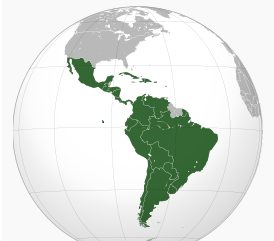América Móvil is suffering the consequences of new Mexican anti-trust rules that forbid telecom companies from controlling more than 50% of the market. The Financial Times noted that América Móvil is feeling the pain of the new regulations as its second-quarter earnings showed a 9% year-over-year drop in mobile revenues in the group’s home market of Mexico.
However, América Móvil beat market estimates with a 2.4% rise in second-quarter earnings before interest, tax, depreciation and amortization to $5.1 billion. The group’s total revenues surged 4% to $15.67 billion, just beating estimates, but net profit of $1.45 billion fell short of the $1.6 billion forecast by a Reuters poll of five analysts.
América Móvil said it had 338.7 million connections at the end of June, a 3% year-over-year increase. Those connections included 31.6 million landlines, 20 million broadband customers, 20.3 million pay-TV connections and 266.9 million wireless subscribers. The carrier’s wireless subscriber base rose 1.8% during the quarter.
LTE auctions: Brazil’s telecom regulator, Anatel, released rules for the country’s planned 700 MHz spectrum auction that will be used for LTE services. Currently, LTE services are running across the 2.6 GHz band, and serves less than 1% of the country’s total subscriber base. W-CDMA-based 3G technology is used by just over 41% of subscribers, with GSM connections accounting for more than 51%. The 700 MHz auction is expected to take place in September, with the auction rules set to be published after the country’s comptroller general, known as TCU, sets minimum prices for the licenses.
Anatel announced that six blocks of 10×10 megahertz will be auctioned, three of them with national coverage (see graphic below).
Earlier, Anatel released the rules for dealing with potential interference between digital TV and LTE services on the 700 MHz band. Those plans include allowing carriers to offer LTE one year after analog TV is shut down in each municipality. In São Paulo and Rio de Janeiro, LTE services running across the 700 MHz band is expected to be available by the end of 2018.
Argentina’s government has confirmed that its LTE-focused auctions will begin on October 31. The 700 MHz and AWS (1700-2100 MHz) bands will be used for LTE services. Also, the government plans to offer the remaining regional 3G spectrum licenses in the 850 MHz (SRMC) and 1900 MHz (PCS) bands. Interested parties will be able to acquire tender documents beginning July 24, with the pre-qualification stage scheduled for September 18.
The LTE and 3G license auctions are focused on increasing the quality and coverage of mobile services in Argentina, with a portion of the spectrum reserved for a new entrant to the market. The winners of LTE spectrum will be required to provide coverage for all areas with more than 500 people (about 98% of the population) within five years. The licenses will be valid for 15 years. The 3G spectrum licenses will be divided into three geographical areas: north, south and the metropolitan area of Buenos Aires.
Viettel launch in Peru: Peru will see a fourth operator enter the local market on July 26, when Vietnamese state-owned carrier, Viettel, is set to begin offering services under the Bitel brand. The launch was originally expected last year. The carrier signed a concession contract with the Peruvian government to secure a 25 megahertz spectrum license in the 1.9 GHz band. The company plans to penetrate the market with low prices, and it will compete with Telefónica, Nextel and Claro.
More news from Latin American region:
- Millicom saw 5.4% growth in revenues during the second quarter of this year to $1.45 billion, while expanding service throughout the Latin American region.
- Ericsson announced that it had prepared Telefónica’s network for the World Cup event in Brazil.
- Ecuador telecom regulatorConatel said it will reduce the processing time for number portability from four days to 24 hours starting in late November. It has been five years since number portability was enacted in Ecuador, allowing both prepaid and postpaid mobile users to change operators while keeping their original numbers. Under the law, more than one million users in Ecuador have already changed carriers.
- TIM Brasil and ZTE signed an agreement to boost mobile broadband.
- Tigo launched LTE in Bolivia.
- In Costa Rica, Claro selected Ericsson as the sole supplier for its LTE network. Claro’s commercial offer will be available initially to prepaid subscribers in some Costa Rican cities and provinces, such La Uruca, Santa Ana, Escazú (San José), Alajuela and Heredia.
- Movistar Chile plans to reach 50,000 Internet video customers by the end of the year.
- Chile and Argentina move forward on eliminating roaming fees between the two countries.
Wondering what’s going on in Latin America? Why don’t you follow me on Twitter? Also check out all of RCR Wireless News’ Latin American content.


